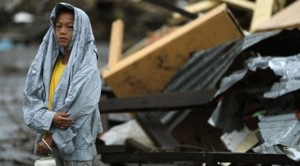
A young boy waits at the side of the road for fresh water surrounded by debris from Typhoon Haiyan in Tacloban, central Philippines, Tuesday, Nov. 12, 2013. AP FILE PHOTO
PALO, Leyte—Four survivors of Supertyphoon “Yolanda” representing a cross section of this town’s population returned wads of money that were not theirs, earning praise and respect from an international charity group distributing cash assistance here.
Tzu Chi, a Taiwan-based Buddhist humanitarian relief organization, identified the four honest typhoon survivors as college professor Pascualito Ilagan, warehouse worker Bonaparte Lorenzo, fish vendor Noemi Caneja and lawyer Ma. Bella Castillo.
“In a time of great need and want, what these four honest people showed is the sterling qualities and great character that will make any Filipino proud,” said Alfred Li, chief executive officer of Tzu Chi Philippines.
As the skies here cleared for better weather after weeks of rain, the news about the four honest Waraynons also provided a welcome respite from widespread complaints about irregularities and favoritism in the distribution of relief goods and services in typhoon-battered villages.
Li said the charity did not know how the excess cash made it into the recipient’s envelopes but speculated that some of the group’s foreign volunteers who were not familiar with the local currency may have inadvertently made the mistake of stuffing extra cash into some envelopes.
“If I took that money, that would have been a great contradiction on my part. It is just not me,” said Ilagan, 53, who teaches, among other subjects, ethics and laws at Eastern Visayas State University in Tacloban City.
He returned a plastic token that would have allowed him to claim an extra P12,000 from Tzu Chi, which means compassionate relief in Chinese.
Right thing to do
For fish vendor Caneja, whose concrete house in Cogon village was destroyed by giant storm surges last Nov. 8, returning the money was just the right thing to do.
The 58-year-old grandmother said she was only supposed to receive P8,000, but she found an extra P8,000 in her envelope.
She immediately returned the excess cash of 16 P500 bills.
Forced to provide for her family after her husband, Amado Racquel, suffered a stroke, Caneja said she did not know anything about Buddhism, but stressed that it would have been a form of betrayal had she kept the money knowing that the foreigners had come here to help the typhoon victims.
“It is just natural for me to make some profit when I sell my fish, but to take money that is not mine is just plain wrong,” Caneja said.
“A clean conscience is still better than having dirty money,” she added.
Help to others
Castillo, 50, an assistant city prosecutor in Tacloban City, said she found an extra P500 in her envelope, which was supposed to contain only P12,000, and immediately returned it.
“That P500 can be a big help to other people. We should be thankful enough that these Buddhist friends with their helping hands and acts of compassion are here to help us,” she said.
Lorenzo, 41, a warehouse worker at Coca-Cola Bottling Co. in Tacloban City, found that he had P21,000 in his envelope. Although he had six family members, he was supposed to receive only P15,000.
But he said he could not in all conscience keep the extra P6,000.
“I would be setting a bad example to my three children,” Lorenzo said.
Sitting outside their devastated house in San Fernando village, Lorenzo’s mother, Francisca, beamed with pride as she looked at her son and listened to him recount how he returned the money.
“I always told my children to do the right thing and I am so proud of him,” said the 79-year-old former schoolteacher.
10M volunteers
Tzu Chi’s army of 10 million volunteers in 47 countries raises money by using bamboo coin banks to solicit donations in public places, much like the bell-ringing tin can volunteers of the Salvation Army in the United States.
Encouraged by three Catholic nuns in 1966 to get out of her temple and do charity work instead of too much prayer and meditation, Buddhist nun Cheng Yen asked 30 housewives in Hualien, Taiwan, to start what is now the biggest nongovernment organization in the Chinese-speaking world.
In 1991, Tzu Chi won the Ramon Magsaysay Award, Asia’s equivalent of the Nobel Prize, for its charity work.
Li on Monday presided over the distribution of cash assistance of P8,000 for a family with two members, P12,000 for a family of three and P15,000 for a family with at least five members.
He said the cash handouts were intended as shelter assistance and had benefited more than 3,500 families here, mostly in the hard-hit coastal villages of San Joaquin, Cogon, Salvacion and Baras.
Reviving economy
According to Li, the aid injected at least P15 million into the town’s economy this week and stimulated economic activity that had been rendered moribund by the massive storm.
Brisk sales of food and other consumer goods as well as construction materials were reported at Palo Public Market and the nearby Robinsons Mall, which recently opened after it was bled dry by looters after the typhoon.
“Almost everyone is clutching P500 peso bills. It’s like people just received their Christmas bonuses,” local trader Jeremias Chiquillo said.
“When you answer an act of compassion with a similar act of compassion, our world is a better place,” Li said.
RELATED STORIES
UN probes ‘Yolanda’ aid to Philippines
UK embassy denies report on ‘Yolanda’ aid not reaching victims
UN launches fresh ‘Yolanda’ aid appeal